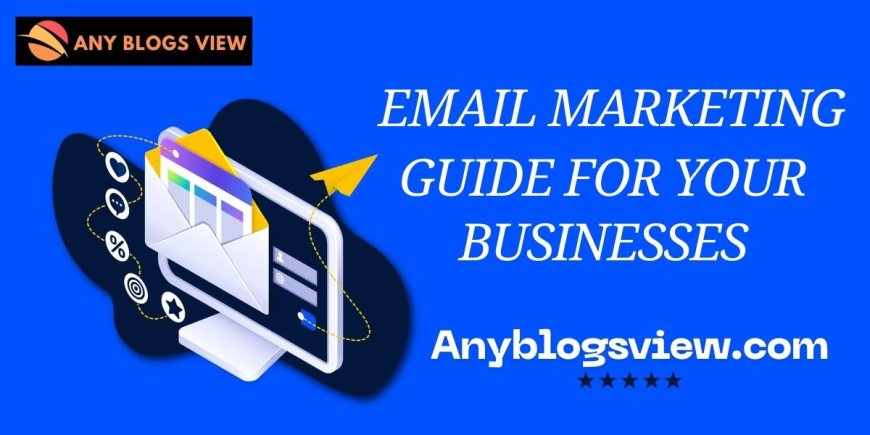A Beginner’s Guide to Email Marketing for Small Businesses
Email Marketing

Email marketing is one of the most effective tools small businesses can use to build relationships with customers, increase sales, and strengthen brand loyalty. In this beginner’s guide, we’ll explore the key aspects of email marketing, how to make it work for your business, and some specialized uses like email marketing for dental practices. Along the way, we’ll cover important topics such as email drip campaigns, email blacklisting, crafting compelling email subject lines, and utilizing email coupons.
What Is Email Marketing?
Email marketing involves sending targeted emails to a list of subscribers with the goal of promoting products, services, or building relationships. It is a cost-effective way to connect directly with potential and existing customers. By tailoring messages to the interests and needs of your audience, email marketing can deliver a strong return on investment (ROI).
For small businesses, email marketing offers an accessible platform to engage with customers, nurture leads, and drive sales without requiring a large advertising budget.
Why Email Marketing Is Effective
Many small businesses ask, “Is email marketing effective?” The answer is a resounding yes! Here’s why:
- Direct Communication: Email lands directly in your customer’s inbox, providing a personal touch and higher engagement than social media posts or ads.
- High ROI: According to research, email marketing generates $36 for every $1 spent, making it one of the most cost-effective marketing strategies.
- Customer Retention: By providing value through newsletters, promotions, or updates, businesses can maintain strong relationships with their audience.
- Versatility: Whether you’re sending product updates, special offers, or educational content, email marketing adapts to suit your goals.
Key Components of a Successful Email Marketing Campaign
To get the most out of email marketing, it’s essential to focus on these elements:
1. Email Subject Lines
The email subject line is the first thing your subscribers see. Crafting compelling email subject lines is crucial to improving open rates. Follow these best practices:
- Be Clear and Concise: Avoid confusing or overly long subject lines.
- Use Personalization: Include the recipient’s name or tailor the message to their preferences.
- Create Urgency: Phrases like “Limited Time Offer” or “Act Now” can prompt quicker action.
- A/B Test: Test different subject lines to determine what resonates best with your audience.
2. Email Drip Campaigns
Email drip campaigns involve sending a series of pre-written emails to subscribers over time. These campaigns are automated, making them a time-saving strategy for small businesses. Benefits of email drip campaigns include:
- Lead Nurturing: Guide prospects through the sales funnel with timely, relevant content.
- Automation: Set up once and let the campaign run automatically.
- Higher Engagement: Gradual communication keeps your brand top-of-mind.
For example, a new customer could receive a welcome email, followed by educational content, and eventually, a special offer to convert them into a paying customer.
3. Email Coupons and Offers
Including email coupons in your campaigns is an effective way to drive sales. Customers love discounts, and email is a direct channel to deliver them. Tips for using email coupons:
- Personalize Offers: Tailor discounts based on the recipient’s purchase history or preferences.
- Time-Limited Coupons: Create urgency to encourage quick action.
- Track Redemption: Use unique coupon codes to measure the success of your campaign.
Avoiding Email Blacklisting
One of the biggest challenges in email marketing is staying off email blacklists. Email blacklisting occurs when your emails are flagged as spam, causing them to be blocked or ignored by recipients. To prevent this:
- Use Double Opt-In: Require subscribers to confirm their email addresses to ensure they genuinely want to receive your emails.
- Provide Value: Avoid spammy or irrelevant content that leads to high unsubscribe rates.
- Monitor Bounce Rates: Regularly clean your email list to remove invalid addresses.
- Follow Legal Guidelines: Comply with email marketing regulations, such as GDPR or CAN-SPAM.
Specialized Email Marketing: A Focus on Dental Practices
Email marketing for dental practices is a niche but highly effective strategy for engaging patients and building long-term relationships. Here’s how dentists can benefit:
- Appointment Reminders: Use email to send timely reminders for upcoming appointments.
- Educational Content: Share tips on dental hygiene or updates about new treatments.
- Seasonal Promotions: Offer discounts on teeth whitening or other services during holidays.
- Patient Retention: Send personalized emails on patient birthdays or anniversaries.
By utilizing email drip campaigns and crafting compelling email subject lines, dental practices can enhance their patient communication and retention efforts.
Is Email Marketing Right for Your Business?
Now that you know the basics, you might still wonder, “Is email marketing effective for my specific business?” Here’s how to determine if it’s the right fit:
- Assess Your Audience: If your customers are online and check their emails regularly, email marketing is a great option.
- Evaluate Your Resources: While email marketing is cost-effective, it requires some investment in tools like email automation software.
- Consider Your Goals: Whether you aim to increase sales, build loyalty, or educate your audience, email marketing is versatile enough to meet your objectives.
Tools and Best Practices for Small Businesses
To succeed with email marketing, you need the right tools and strategies:
Tools
- Email Marketing Platforms: Popular options like Mailchimp, Constant Contact, or ActiveCampaign make it easy to design, send, and track emails.
- Analytics Tools: Measure open rates, click-through rates, and conversions to optimize future campaigns.
Best Practices
- Segment Your Audience: Divide your subscribers into groups based on their behavior or demographics for more targeted campaigns.
- Mobile Optimization: Ensure your emails look great on all devices, as many people check emails on their phones.
- Consistent Branding: Use consistent colors, fonts, and logos to reinforce your brand identity.
Conclusion
Email marketing is a powerful tool that small businesses can use to connect with their audience, drive sales, and build lasting relationships. Whether you’re running a dental practice or a retail store, leveraging strategies like email drip campaigns, crafting enticing email subject lines, and offering email coupons can make your efforts more effective.
Avoid pitfalls like email blacklisting by following best practices and ensuring your content is valuable and relevant. With the right tools and approach, email marketing can become a cornerstone of your business growth strategy.
What's Your Reaction?














![Noots Focus Reviews [Truth Exposed 2025]!](https://news.bangboxonline.com/uploads/images/202501/image_430x256_678e3b94881a1.jpg)
![Vivalis Male Enhancement: The Must-Know Ingredients [2025 Update]](https://news.bangboxonline.com/uploads/images/202501/image_430x256_678e3b54e396c.jpg)







